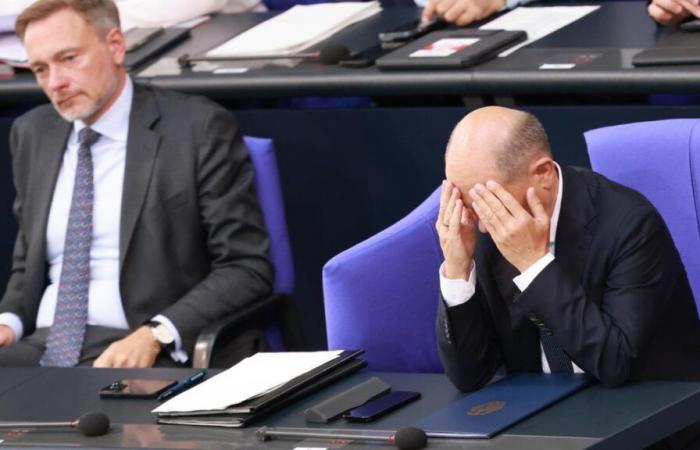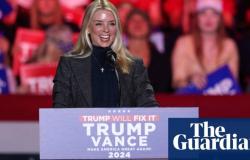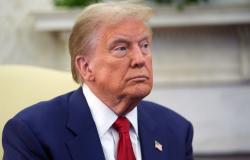As of: November 7th, 2024 5:29 a.m
The traffic light is at the end. The violent accusations made by Chancellor Scholz and Finance Minister Lindner show that the relationship must have been quite broken recently. The election campaign has already started.
The election of Donald Trump would have been enough to make November 6th a day to remember. But then the end of the traffic light coalition follows in Berlin in the evening. And with a bang: Chancellor Olaf Scholz appears in front of the press and expresses himself with a passion that was often missing from him. He accuses his previous coalition partner Christian Lindner of breach of trust. Lindner has shown no willingness to implement suggestions for the good of the country. “I no longer want to subject our country to this kind of behavior.”
First cracks on the issue of the debt brake
This is said by a chancellor who, in the almost three years of the traffic light coalition, has often positioned himself closer to Lindner than to the Greens and his own comrades, especially on economic issues. For example, he rejected the demand for an industrial electricity price in line with Lindner. When it came to the budget, Scholz did not make any negative comments – at least publicly – about his successor as finance minister in the first two traffic light years.
That only changed this summer. When it came to the question of how budget holes worth billions could be plugged, Scholz and Lindner clashed publicly. The question was already about the extent to which the budget can be balanced through higher debts – an issue that ultimately also plays an important role in the traffic lights being turned off.
“You had to see that as a provocation”
The concrete trigger for the end this week is the latest economic paper by FDP Finance Minister Lindner, in which he made demands that were taken by the SPD and the Greens as a declaration of war. Shifting the climate targets, restrictions on social spending – “that had to be seen as a provocation,” said Economics Minister Robert Habeck in the evening. The Green politician still believes that the traffic lights were turned off as wrong: it was tragic, especially on a day when Germany actually had to demonstrate its strength to act.
Lindner’s demands actually went far beyond the traffic light growth initiative agreed in July. His approach was reminiscent of the Lambsdorff paper from 1982, which was the reason for the end of the then social-liberal coalition under Helmut Schmidt.
Lindner counterattacks
But Lindner also made it clear late in the evening: he doesn’t accept the buck for the traffic lights being turned off, he returns it to Scholz straight away. He accuses the Chancellor of a calculated break in the coalition. Scholz ultimately demanded that he suspend the debt brake – but by doing so he would have violated his oath of office as finance minister.
At the same time, Lindner is launching a counterattack when it comes to the economy: “Olaf Scholz has long failed to recognize that our country needs a new economic awakening. He has long trivialized the economic concerns of the citizens.” The Chancellor’s counter-proposals to his paper are weak, Scholz does not have the strength to enable Germany to make a new departure.
This shows, as with Scholz’s statement, how much discontent must have built up within the traffic lights in the past few weeks and months. With Lindner, Scholz speaks of party-politically motivated egoism and publicly staged arguments.
Call an die Union
At the same time, it becomes clear that the existing partners are already keeping an eye on the planned new elections. Scholz wants to face a vote of confidence in mid-January, which – in the event of probable failure – could lead to new elections to the Bundestag at the end of March 2025. Until then, he wants to govern alone with the Greens, but also seek talks with the Union parties CDU and CSU in order to get parliamentary majorities for important legislative proposals.
Economics Minister Habeck also appeals to the Union’s political responsibility. Like Scholz, the Green politician blames the FDP for the traffic light failure: He had the impression that Lindner and the FDP were looking for a way out of the coalition, said Habeck in the daily topics. At the same time, he warns of a longer phase of uncertainty in which important decisions cannot be made. It is expected that the federal budget for 2025 cannot be passed until the middle of next year.
Die Top candidates are already fixed
This in turn is an argument for the opposition: CSU chairman Markus Söder is calling for new elections in January, BSW boss Sahra Wagenknecht speaks of political delay in insolvency.
Regardless of when new elections actually take place, important decisions will be made for the parties in the coming weeks. After today, there should no longer be any doubt in the SPD that it is going into the election campaign with Scholz – such leadership strength was rare. The Greens, in turn, are likely to officially proclaim Habeck as their candidate for chancellor at their federal party conference in just over a week. Finally, leading liberals leave no doubt that Lindner is the party’s undisputed number one after this evening and that they will go into the next election campaign with him.
Hans-Joachim Vieweger, ARD Berlin, tagesschau, November 7th, 2024 1:23 a.m






